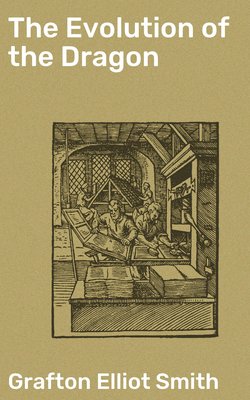Читать книгу The Evolution of the Dragon - Grafton Elliot Smith - Страница 6
На сайте Литреса книга снята с продажи.
Оглавление[3] An elaboration of a Lecture on the relationship of the Egyptian practice of mummification to the development of civilization delivered in the John Rylands Library, on 9 February, 1916.
[4] "Introduction to the History of Religions," p. 486.
[5] He might start upon this journey of adventure by reading the article on "Incense" in Hastings' Encyclopædia of Religion and Ethics.
[6] Samuel Laing, "Human Origins," Revised by Edward Clodd, 1903, p. 38.
[7] "Ancient Hunters," 2nd Edition, pp. 234 and 235.
[8] On this subject see Elliot Smith and Pear, "Shell Shock and its Lessons," Manchester University Press, 1917, p. 59.
[9] An interesting discussion of this matter by the late Professor William James will be found in his "Principles of Psychology," Vol. I, pp. 261 et seq.
[10] For a fuller discussion of certain phases of this matter see my address on "Primitive Man," in the Proceedings of the British Academy, 1917, especially pp. 23–50.
[11] "The Influence of Ancient Egyptian Civilization in the East and in America," The Bulletin of the John Rylands Library, Jan.-March, 1916.
[12] "The Migrations of Early Culture," 1915, Manchester University Press: "The Evolution of the Rock-cut Tomb and the Dolmen," Essays and Studies Presented to William Ridgeway, Cambridge, 1913, p. 493: "Oriental Tombs and Temples," Journal of the Manchester Egyptian and Oriental Society, 1914–1915, p. 55.
[13] "Ships as Evidence of the Migrations of Early Culture," Manchester University Press, 1917, p. 37.
[14] "Egyptian Mummies," Journal of Egyptian Archæology, Vol. I, Part III, July, 1914, p. 189.
[15] Such, for example, as its influence in the acquisition of the means of preserving the tissues of the body, which has played so large a part in the development of the sciences of anatomy, pathology, and in fact biology in general. The practice of mummification was largely responsible for the attainment of a knowledge of the properties of many drugs and especially of those which restrain putrefactive changes. But it was not merely in the acquisition of a knowledge of material facts that mummification exerted its influence. The humoral theory of pathology and medicine, which prevailed for so many centuries and the effects of which are embalmed for all time in our common speech, was closely related in its inception to the ideas which I shall discuss in these pages. The Egyptians themselves did not profit to any appreciable extent from the remarkable opportunities which their practice of embalming provided for studying human anatomy. The sanctity of these ritual acts was fatal to the employment of such opportunities to gain knowledge. Nor was the attitude of mind of the Egyptians such as to permit the acquisition of a real appreciation of the structure of the body.
[16] See my address, "Primitive Man," Proc. Brit. Academy, 1917.
